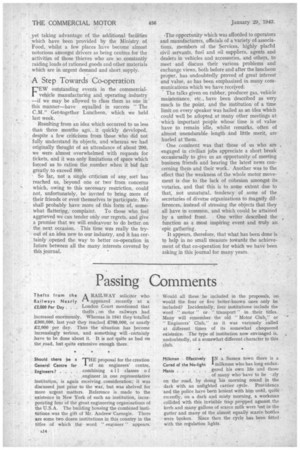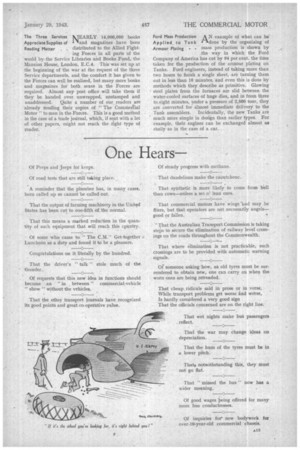Passing Comments
Page 16

Page 17

If you've noticed an error in this article please click here to report it so we can fix it.
Thefts from the A RAILWAY solicitor who Railways Nearly r-k appeared recently at a.
£2,000 Per Day . . London Court mentioned that thefts . on the railways had increased enormously. Whereas in 1941 they totalled £360,000, last yeat they reached £700,000, or nearly £2,000 per day. . Thus the situation has become increasingly serious, and something will certainly have to be done about it. It is not quite as bad on the road, but quite extensive enough there.
Should there be a T" proposal for the creation General Centre for of an engineers' centre, Engineers ! . . . . combining a II classes o f engineer in one representative institution, is again receiving consideration; it was discussed just prior to the war, but was shelved for more urgent matters. Reference is made to the existence in New York of such an institution, incorporating four of the great engineering organizations of the U.S.A. The building housing the combined institutions was the gift of Mr. Andrew Carnegie. There are some two dozen institutions in this country in the titles of which the word " engineer " appears.
Would all these be included in the proposals, orwould the four or five better-known ones only be included? Incidentally, four institutions include the word " motor " or " transport' in their titles. Many will remember the old "Motor Club," or "Engineers' Club," as it was variously Called at different times of its somewhat chequered existence. The type of institution now envisaged is, undoubtedly, of a somewhat different character to this club,
Milkman Effectively IN a Sussex town there is a Cured of the No-light I milkman who has long endan Mania gered his own life and those of many who have to he -,rly on the road, by doing 'his morning round in the dark with an unlighted carrier cycle. Providence and the police have been lenient with him until, quite recently, on a dark and misty morning, a workman collided with this invisible trap propped against .the kerb and many gallons of scarce milk were lost in' the gutter and many of the almost equally scarce bottles were broken. Since then the cycle has been fitted with the regulation lights.
The Three Services MEARLY 14,000,000 books Appreciate Supplies of land magazines have been Reading Matter . . distributed to the Allied Fight
ing Forces. in all parts of the world by the Service Libraries and Books Fund, the Mansion House, London, E.C.4. This was set up at the beginning of the war at the request of the three Service departments, and the comfort it has given to the Forces can well be realized, but many more books and magazines for both sexes in the Forces are required. Almost any post office will take them if they be handed over unwrapped, unstarnped and
unaddressed. Quite a number of our readers are already sending their copies of "The CommeAial Motor " to men in the Forces. This is a good method in the case of a trade journal, which, if sent with a lot of other papers, might not reach the right type of reader.
Ford Mass Production A N example of what can be Applied to Tank r-Idone by the organizing of Armour Plating mass production is shown by the way in which the Ford Company of America has cut by 94 per cent. the time taken for the production of the armour plating on Tanks. Ford engineers, instead of taking more than two hours to finish a single sheet, are turning them out in less than 10 minutes, and even this is done by methods which they describe as primitive. Glowing steel plates from the furnaces are slid between the water-cooled surfaces of huge dies, and in from three to,eight minutes, under a pressure of 2,500 tom, they are converted for almost immediate delivery to the Tank assemblers. Incidentally, the new Tanks are much more simple in design than earlier types. For example, their engines can be exchanged almost as easily as in the case of a car.




















































